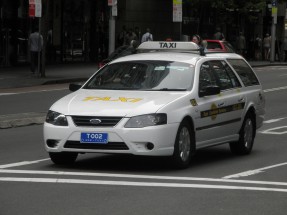The federal competition watchdog’s campaign to enforce fairer competition in Australia’s notoriously cloistered taxi industry has taken a significant step forward after dominant payments processing player Cabcharge finally accepted a court enforceable undertaking to let rival firms accept its cards.
The undertaking made to the Australian Competition and Consumer Commission (ACCC) means that Cabcharge Australia must negotiate in good faith with rival payment processors, who will soon be able to process Cabcharge cards on their own in-taxi payment terminals.
Having successfully resisted regulatory intervention for years, the deal struck between Cabcharge and the ACCC opens the way for competing payment platforms to take a bigger cut of non-cash fares that they would not otherwise have access to.
To date, third parties have been unable to reach agreement with Cabcharge to process its cards on their terminals. This limited their ability to compete with Cabcharge for the acceptance and processing of non-cash payments in taxis.
Cabcharge’s subsequent near-monopoly has been frequently criticised inside and outside the industry and led to frequent complaints that cabs in Australia, and especially in Sydney, are overpriced with both drivers and passengers paying the price.
It has been one example of how the cab industry, for years led by the late Reginald Kermode, has had to change its ways. For decades it was a politically powerful closed shop. More recently challenges by online upstarts like Uber have challenged its monopoly, but it is only really since Kermode’s death in 2014 that the wider cab industry has been forced to play be the same rules as most other industries.
“The undertaking opens up this market to further competition and will provide third parties with the ability to process Cabcharge cards for the first time,” ACCC Chairman Rod Sims said. “The undertaking provides a clear pathway to facilitate third parties processing Cabcharge cards.
“If third parties obtain access, this will allow them to better compete against Cabcharge for processing revenue, as Cabcharge will no longer be the only terminal in a taxi that can process all forms of commonly used non-cash payment.”
Cabcharge has undertaken, for a period of five years, to:
• negotiate with third parties in good faith in relation to providing access to the system that will allow them to process Cabcharge cards.
• execute an agreement with third parties who apply for access in accordance with the provisions set out in the undertaking.
• provide to a third party which has executed an agreement any reasonable technological support requested by the third party to enable it to process Cabcharge cards.
• provide access to third parties that have demonstrated they can provide processing services on the terms set out in the agreement.
Mr Sims said Cabcharge has cooperated with the ACCC and has made a significant investment towards facilitating third party access, by developing software that enables third parties to process Cabcharge cards.
The issue goes back some years. In 2010, the Federal Court made orders that Cabcharge pay $15 million in penalties and costs for three contraventions of the Trade Practices Act (now the Competition and Consumer Act 2010), by refusing to deal with certain firms and engaging in predatory pricing.
The Court’s orders obliged Cabcharge to establish a written set of criteria against which it would assess every request for another business to accept or process Cabcharge cards by electronic means or with an EFTPOS or other electronic system for the payment, by non-cash means, of fares and charges incurred by taxi passengers.
The undertaking now provided by Cabcharge arises from an investigation by the ACCC into allegations that, between 2011 and 2012, Cabcharge had refused to deal with a third party processor making requests pursuant to the Request Processing Policy.
The investigation also concerned allegations that Cabcharge had constructively refused to deal with third parties by establishing and implementing the Request Processing Policy in terms that would discourage or deter requests.
The undertaking is available here.
Comment below to have your say on this story.
If you have a news story or tip-off, get in touch at editorial@governmentnews.com.au.
Sign up to the Government News newsletter

